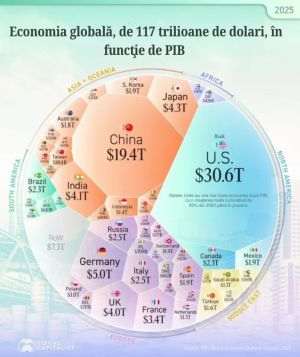
The budget execution of the first nine months represented a pleasant surprise: the scale of the disaster was published after a delay of only a few days.
Considering the deficit value, of 2.62% of the GDP estimated and "corrected" by the National Forecast Commission for 2019, the future government is certainly not in an enviable position, given the "balancing act" it will have to perform.
A few months ago, I was wondering what the Ministry of Finance is good at doing, if it can't even publish the budget execution on time.
The question was, of course, rhetorical, and later the destructive trend escalated under the leadership of an irresponsible minister, so much so it's actually impossible to find the words to describe him.
We must admit, however, that the deepening of the budget deficit against the background of an economic growth of 7.1% in 2017 and 4.1% in 2018 represents an impressive "performance".
It increased, in the first nine months of the current year, to almost 27 billion lei, a 60.9% increase YOY and 295.6% higher than the budget deficit in the first nine months of 2017.
Beyond the irresponsibility of governments that have seriously undermined public finances, this evolution of the budget deficit simply reflects the economic illiteracy of the "authorities".
There would be no reason for condemnation, if the same "authorities" didn't want to make development programs and plan the economy, while choking off private companies with all sorts of absurd laws and regulations. The fact that some of these may be "implemented" according to foreign directives is not a mitigating circumstance, but a particularly aggravating one.
And that's not all. According to the "twin deficits" theory, there is a strong causal link between the budget deficit and the current account deficit, which can be illustrated starting from the fundamental equation of national accounts, C + I + G + X = C+ S + T + M, where the four categories of production (from the left side of the identity) are consumer goods and services (C), capital goods (I), government activities (G) and exports (X).
The productive activities will generate revenues, which will be used for consumption (C), saving (S), payment of taxes (T) and imports (M).
If the two C elements of the equation cancel each other, then the new identity will be (X-M) = (S-I) + (T-G), i.e. a deficit on the right, which implies that domestic saving is not sufficient to finance the investments. and / or the taxes do not fully finance the budgetary expenses, and it will be matched by an external deficit with a similar value.
The data from the NBR shows a strong increase in the current account deficit over the last three years, as a result of the accelerated growth of the trade deficit.
Without a rapid correction of this negative trend, the relative stability of the national currency cannot be maintained indefinitely, especially given the serious worsening of the outlook of the European economies.
Unfortunately, this has also come about as a result of facilitating fiscal irresponsibility through a relaxed monetary policy. In other words, the extremely toxic combination of pro-cyclical fiscal and monetary policies has fueled the accelerated growth of twin deficits, and the inevitable solution is budgetary austerity, regardless of the political color of future governments, an austerity that encompasses even the "sacred" chapter of the so-called investments in infrastructure, which are considered a basic element of economic development.
After three decades of generalized plunder, it may be time for the "authorities" of the state to limit themselves to removing barriers to private initiative and entrepreneurs, while ensuring a fair competitive environment. Also, the "authorities" should forget, for at least a decade, about welfare planning, because the "beneficiaries" may not be around when they announce the achievement of their goal.
The statements of a great Austrian economist from the first half of the last century, Fritz Machlup, about the situation in his country, should something to think about to those in positions of authority in our country, because seldom do things go truly differently where economics is involved.
"Austria has the most impressive achievements in five areas: increased public spending, increased wages, increased social aid, increased bank lending and increased consumption. After all these achievements, Austria has reached the threshold of ruin, "Machlup wrote in the article "Consumption of capital in Austria "in the Review of Economic Statistics (1935).
Could the result be different this time in 2019 AD? But, more importantly, will the future government even publish the budget execution in time?























































